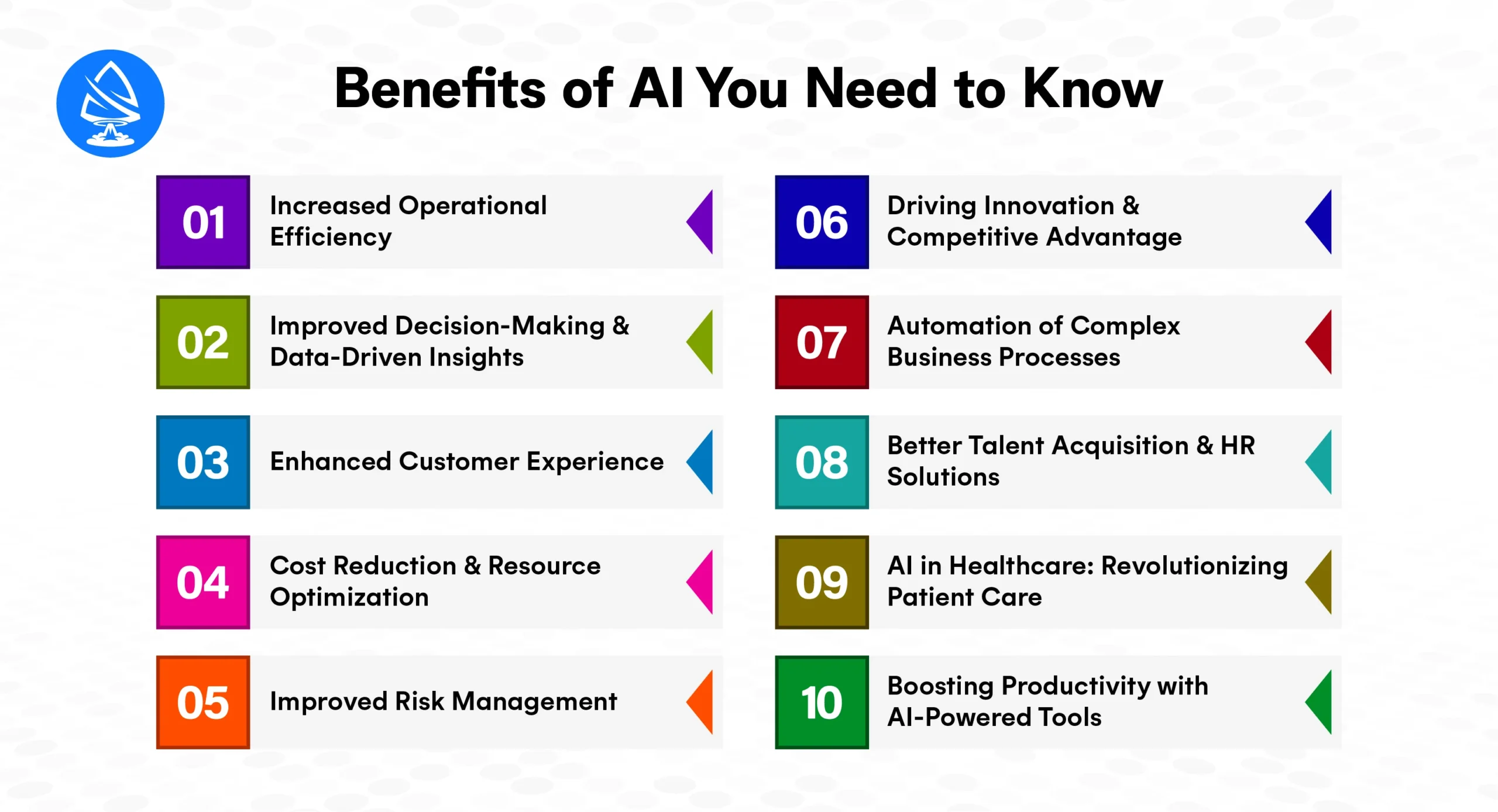- HR:+91-879-9184-787
- Sales:+91-908-163-7774

Artificial Intelligence (AI) is transforming businesses in every industry, from healthcare and finance to e-commerce and manufacturing. The benefits of AI are undeniable. AI is not just for tech companies anymore; it’s shaping the future of all businesses, large and small.
In this guide, we will explore the top 10 business benefits of AI that every company should understand. Whether you’re looking to improve customer service, streamline operations, or make better decisions, AI offers endless opportunities. To unlock the full potential of AI in your business, consider hiring AI developers who can help tailor solutions to meet your specific needs. Let’s dive in!

One of the most significant business benefits of AI is operational efficiency. AI-powered systems can automate a wide range of tasks that would otherwise require manual effort, including:
Example: Retailers use AI to optimize their inventory management systems, automatically adjusting stock levels based on real-time sales data.
AI enables businesses to make better, data-driven decisions. With advanced data analysis and machine learning models, AI can uncover insights that would be nearly impossible for humans to detect.
Example: Financial institutions use AI to predict stock market trends and optimize investment portfolios based on patterns identified in data.
AI is revolutionizing the customer experience, and businesses that use AI are seeing significant improvements in customer satisfaction. Some ways AI enhances the customer experience include:
Example: E-commerce platforms like Amazon use AI to recommend products based on customer preferences, driving higher engagement and conversions.
AI can help businesses optimize their use of resources, leading to significant cost savings. By automating processes, AI eliminates inefficiencies and reduces the need for manual labor, helping businesses save both time and money.
Example: In manufacturing, AI-powered predictive maintenance systems can predict equipment failures before they occur, reducing repair costs and increasing productivity.
One of the significant risks of artificial intelligence is the potential for incorrect data or poor decision-making. However, AI can also mitigate risk by:
Example: Insurance companies use AI to assess claims more accurately and detect fraudulent behavior, helping them reduce risks and losses.
AI can be a powerful tool for fostering innovation within your business. By automating routine tasks, AI frees up resources for creative problem-solving and new product development.
Example: Generative AI systems like DALL·E are enabling businesses in the creative industries to produce art, marketing materials, and design ideas faster than ever before.
AI can handle more than just basic tasks; it’s capable of automating complex business processes that require deep analysis and decision-making, including:
Example: Legal firms use AI to review legal documents and contracts, speeding up the process and reducing the chances of human error.
AI is also improving the way businesses manage their human resources. With AI, HR teams can streamline the hiring process, identify top candidates, and ensure better employee satisfaction.
Example: Companies like HireVue use AI to analyze video interviews and assess candidates based on their responses and facial expressions, speeding up the recruitment process.
The benefits of AI in healthcare are vast. From personalized medicine to predictive diagnostics, AI is improving patient care and enhancing the overall healthcare system.
Example: AI-powered diagnostic tools like DeepMind are being used to identify diseases such as cancer with high accuracy, enabling early intervention.
AI-powered tools can dramatically improve productivity by streamlining workflows and assisting employees with decision-making.
Example: Microsoft 365’s AI-powered features, such as automated email replies, scheduling assistance, and data analysis, enhance productivity for business users.
The benefits of AI are undeniable in today’s fast-paced, data-driven world. From automating tasks and improving decision-making to enhancing customer experiences and fostering innovation, AI is revolutionizing industries and driving business success. By embracing AI, businesses can streamline operations, gain valuable insights, reduce costs, and stay competitive in the marketplace.
If you’re considering integrating AI into your business, hiring skilled AI developers or working with an AI development company is the first step toward unlocking the full potential of this transformative technology.
AI improves operational efficiency, enhances customer experience, enables better decision-making, and drives innovation in business.
AI automates repetitive tasks, optimizes workflows, and reduces human error, ultimately saving businesses time and money.
Yes, AI-powered chatbots and virtual assistants provide 24/7 support and personalized interactions, enhancing the customer experience.
Absolutely! Small businesses can use AI to automate tasks, improve customer support, and analyze data to make more informed decisions.
AI improves diagnostic accuracy, enables personalized treatment plans, and optimizes hospital management, improving patient care and operational efficiency.
AI is transforming industries such as healthcare, finance, retail, manufacturing, e-commerce, and logistics.
While AI offers numerous benefits, it also carries risks such as bias in algorithms, job displacement, and potential privacy concerns.